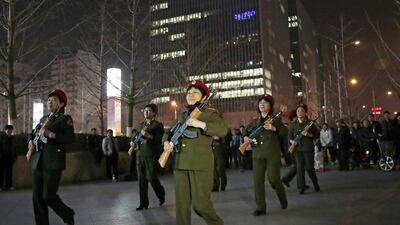BEIJING // Along with two dozen of her fellow “dancing grannies”, 60-year-old Zhang Jinsu twirls and steps her way every night across a central Beijing plaza, sometimes gliding over the pavement like a butterfly, at other times marching with a plastic rifle.
But when new Chinese government instructions on such hugely popular – and loud – senior dances take hold, Ms Zhang may need to learn a new routine.
Ms Zhang is part of a senior health trend that has filled squares and apartment courtyards across China.
While the trend is winning the admiration of medical experts, the noise level is upsetting neighbours.
“It’s never quiet,” said Gan Xuehua whose apartment in Nanchang overlooks a plaza where the women dance.
“These grannies play music all day ... and every night from 7 to 9. It culminates with 70 to 80 people gathering with two 75-centimetre-tall speakers. The music is really loud!”
This week, Chinese officials stepped into the fray by announcing the imminent arrival of new regulations on where seniors can dance and how loud they can blast their music.
They also unveiled 12 officially sanctioned square dance steps set to such popular songs as Little Apple and China is Beautiful – although an official said the steps were not compulsory and merely a suggestion.
To some, the square-dance clampdown was a step too far for an increasingly restrictive government that has tightened controls on everything from college classroom lectures to the lavish spending of top government officials.
“You’re even going to tell us how to dance?” asked Yang Tao on the social media service Weibo.
As a precaution, Ms Zhang said her fellow dancers who gather in front of the Raffles Centre in downtown Beijing have already stopped all dances by 9.30pm. And to show a government afraid of any sort of organised action, they have started re-enacting ultrapatriotic Second World War-era skits where they act like Chinese soldiers apprehending Japanese and German bad guys, to the rhythm of a live band.
“There have been people who have criticised us, but we all came to an understanding and solved the problem,” Ms Zhang said. “We do more theatrical dancing, different from the plaza dancing where everyone stands in their own square metre. These new regulations have been discussed for a year now, but we’ve chosen an appropriate place to dance.”
An official at the national general administration of sport who would only give her surname Yao said the new steps were not mandatory.
“Apart from those 12 dances, we are also asking people to suggest other dances too,” Ms Yao said. “The original goal is to help people exercise in a healthier and more scientific way. We invited health experts to be involved in the choreographing, just to make sure the dances are not too active, because they might not be good for some people with neck problems or heart problems.”
She said her department was also working with the culture ministry on “specific guidelines on the volume of music” played at the dances and other details.
The popularity of the Chinese square dances, which have been spotted even in Moscow and New York, springs from an urban landscape lacking enough parks and other public spaces that pushes people to gather in front of shopping centres or in playgrounds, said Caroline Chen, an environmental planning expert at the University of California.
Those same factors help explain the ire occasionally sparked among nearby neighbours, including one Beijing man who did prison time after he fired a rifle into the air and released three dogs on several dancers in 2013.
In the coastal city of Wenzhou last year, people pooled more than US$40,000 (Dh146,900) to buy a military-grade loudspeaker to retaliate against women dancing to boom boxes in a tit-for-tat escalation of noise.
Mr Gan, whose apartment overlooked the dancing women, said he has complained to local authorities, police and even the National People’s Congress.
“There’s nothing that can stop them from dancing. I thought it would be an easy problem to solve because everyone knows it’s not good to disturb others, but I was too naive,” he said.
For 52-year-old Huang Shihui, the nightly dances have gotten her out of the house and introduced her to a whole new set of friends. She said she did not mind the restrictions, as long as the music did not stop.
“If I didn’t dance, I’d just eat and watch TV,” she said before donning a red beret and olive-green military uniform to hit the plaza.
* Associated Press

